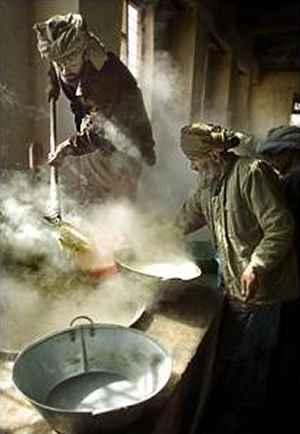MEDICAL MALADIES
Prison doctors have begged
for medicine from Dostum’s military hospital in Shibergan. Only a few boxes
of antibiotics and rehydration salts have been sent to Shibergan, one of
the largest detention camps in the country.
An official at the hospital,
speaking on condition of anonymity, said supplies are critically low and
there is little money to buy more. “The Taliban prisoners are not a priority,”
he said.
Nearly a third of the prisoners
at Shibergan are suffering from chronic dysentery and other gastric problems,
doctors said.
“We have no medicine. It
couldn’t be worse,” said Dr. Abdul Bashir, one of four prison physicians.
“No, let me correct that. I will get worse when the weather gets warmer.
We could be seeing things as bad as cholera.”
The Red Cross, under its
mandate as a neutral watchdog of prison conditions, cannot provide a steady
supply of food or medicine. It does arrange daily deliveries of 5,200 gallons
of water — well below what’s needed, doctors say.
“This is not a crisis?” asked
Bashir. “We just can’t take care of the prisoners.”
The worst cases — mostly
bronchitis and tuberculosis — are sent to the military hospital. Others
are placed on feces-stained beds or on straw mats in the prison clinic.
One inmate carried another who had blacked out from high blood pressure.
He was put on the floor, but there was no way to treat him.
THE ENEMY AS SAVIOR
Many prisoners see their
former enemy as a possible savior.
“The United States should
help us. How can the world ignore us?” pleaded Maqsoud Khan, 26, who is
among about 1,100 Pakistani prisoners in Shibergan.
Khan wrapped himself in a
blue blanket donated by the Red Cross. But it offered little warmth against
a bitter cold wind, which froze the puddles and hardened the mud in the
prison yard. There are no prison uniforms — only the clothes the men wore
when they were captured as U.S.-backed forces retook northern Afghanistan
in November.
The fortunate ones have black
plastic slippers supplied by the Red Cross. Others are barefoot.
After an hour in the prison
yard, the prisoners are herded back to their quarters: bare six-by-nine
foot rooms where up to 60 men try to sleep on icy cold concrete floors.
Latrines empty into fetid swamps.
There were no claims of torture
or specific abuse. The prisoners spoke, however, of another type of agony:
uncertainty about the future.
NO RELEASES, NO FUTURE
Hundreds of Taliban fighters
have been freed around Afghanistan under an ill-defined amnesty encouraged
by the interim government. But there have been no such releases from Shibergan.
“Will we be held here forever?
No one can tell us,” said an Afghan prisoner, Qari Habib Rahman. “We were
simple fighters. We know nothing about the Taliban leaders.”
U.S. interrogators, seeking
Taliban leaders and members of Osama bin Laden’s al-Qaida terror network,
moved several dozen prisoners from Shibergan last month, the warden said.
A commander for Dostum’s
forces said all the other prisoners would remain at Shibergan until the
American investigations are complete. In Washington, Rear Adm. John Stufflebeem
confirmed this week that “initial interrogations” were being conducted
in Shibergan and elsewhere.
Human rights activists and
some U.S. allies have expressed concern over treatment of al-Qaida and
Taliban prisoners at the U.S. military outpost at Guantanamo Bay, Cuba.
And some who have come to Shibergan say the United States also has a role
in determining what happens here.
A delegation for the Physicians
for Human Rights visited Shibergan earlier this month.
“The United States cannot
wash its hands of responsibility for prisoners whose fate from the start
it has been in a position to influence or determine,” its report said.

|
